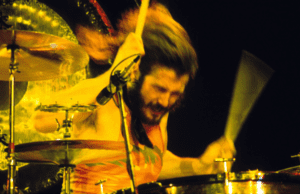 Wednesday September 25, marked the 39th anniversary of John Bonham’s death. Also known as Bonzo or the Beast, Bonham was arguably the greatest drummer in rock n’ roll history. While I may personally be partial to Keith Moon’s overall body of work, Bonzo was immensely talented and a larger than life figure. Bonham was ranked number 1 on Classic Rock’s list of 50 Greatest Drummers in Rock, and Modern Drummer describes him as “the greatest rock ‘n’ roll drummer in history. Aside from his love of music, Bonham had a fierce love of cars, and collected an incredible number of them over his career. He was a hard-hitting, hard-living man, who ultimately met his demise too soon. But his legacy will live on. And now on to this week’s logistics news.
Wednesday September 25, marked the 39th anniversary of John Bonham’s death. Also known as Bonzo or the Beast, Bonham was arguably the greatest drummer in rock n’ roll history. While I may personally be partial to Keith Moon’s overall body of work, Bonzo was immensely talented and a larger than life figure. Bonham was ranked number 1 on Classic Rock’s list of 50 Greatest Drummers in Rock, and Modern Drummer describes him as “the greatest rock ‘n’ roll drummer in history. Aside from his love of music, Bonham had a fierce love of cars, and collected an incredible number of them over his career. He was a hard-hitting, hard-living man, who ultimately met his demise too soon. But his legacy will live on. And now on to this week’s logistics news.
- Amazon in the news:
- Ford’s autonomous vehicles are coming to Austin
- Postmates and Phantom Auto partner for autonomous robot delivery fleet
- Last mile is hindering Bahamas relief efforts
- FedEx plans to cut Express capacity, retire planes
- Hyundai to pay $47 million fine for illegal diesel engine imports
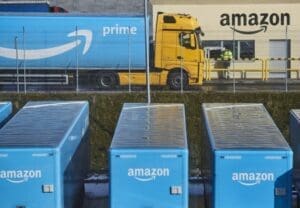 Over the years, Amazon has seemed to have the upper hand on its largest competitor (Walmart) in a number of areas. One area that is not so cut and dry is grocery. Even with Amazon’s acquisition of Whole Foods, Walmart still has the largest grocery network and is the number one seller of organic food. In an effort to chip away at this position, Amazon is expanding its two-hour Whole Foods delivery service. In August, the company began a pilot project in select cities for two-hour delivery. The pilot also mined the purchase histories of Whole Foods shoppers who use their Prime memberships for discounts. Amazon focused on items these customers buy routinely in stores and began offering the same products on its website for free two-hour delivery. The feedback has been positive, and Amazon has quickly extended the service to almost 30 cities, with more on the horizon.
Over the years, Amazon has seemed to have the upper hand on its largest competitor (Walmart) in a number of areas. One area that is not so cut and dry is grocery. Even with Amazon’s acquisition of Whole Foods, Walmart still has the largest grocery network and is the number one seller of organic food. In an effort to chip away at this position, Amazon is expanding its two-hour Whole Foods delivery service. In August, the company began a pilot project in select cities for two-hour delivery. The pilot also mined the purchase histories of Whole Foods shoppers who use their Prime memberships for discounts. Amazon focused on items these customers buy routinely in stores and began offering the same products on its website for free two-hour delivery. The feedback has been positive, and Amazon has quickly extended the service to almost 30 cities, with more on the horizon.
Amazon founder and CEO Jeff Bezos announced the formation of a new organization, the Climate Pledge, to meet the goals of the Paris climate agreement 10 years early. The Paris climate agreement is based on the so-called 20/20/20 target: the reduction of CO2 emissions by 20 percent, the increase of renewable energy’s market share to 20 percent, and a 20 percent increase in energy efficiency. During a press conference, Bezos announced that Amazon will reach 80 percent renewable energy use by 2024 and 100 percent by 2030. One of the big initiatives to achieve this goal is the purchase of 100,000 electric vehicles from a startup Amazon has backed, Rivian Automotive Inc. The first Rivian vehicles will arrive in 2021. Amazon also announced a $100 million donation to the Nature Conservancy to fund the Right Now Climate Fund.
 Ford has been at the forefront of autonomous vehicles, especially as it pertains to last mile deliveries. The company has already piloted some test programs across the US to measure public sentiment and the feasibility of using autonomous vehicles as a delivery method. Now, Ford’s autonomous vehicles are entering a new market: Austin, TX. Ford will start by mapping the streets of downtown Austin this November. Eventually, the size of the fleet and the geographic area will grow until Ford is ready to launch an autonomous taxi and delivery service at scale in 2021, the company said. However, this goes way beyond taxi service. The company is exploring more partnerships for using its autonomous vehicles for last mile delivery, as it has done in the past with Domino’s Pizza. Ford is also working on a “purpose-built self-driving vehicle” that it plans to unveil in 2020. Until then, the company is using hybrid Ford Fusion sedans that have been retrofitted with autonomous sensors, like cameras and LIDAR.
Ford has been at the forefront of autonomous vehicles, especially as it pertains to last mile deliveries. The company has already piloted some test programs across the US to measure public sentiment and the feasibility of using autonomous vehicles as a delivery method. Now, Ford’s autonomous vehicles are entering a new market: Austin, TX. Ford will start by mapping the streets of downtown Austin this November. Eventually, the size of the fleet and the geographic area will grow until Ford is ready to launch an autonomous taxi and delivery service at scale in 2021, the company said. However, this goes way beyond taxi service. The company is exploring more partnerships for using its autonomous vehicles for last mile delivery, as it has done in the past with Domino’s Pizza. Ford is also working on a “purpose-built self-driving vehicle” that it plans to unveil in 2020. Until then, the company is using hybrid Ford Fusion sedans that have been retrofitted with autonomous sensors, like cameras and LIDAR.
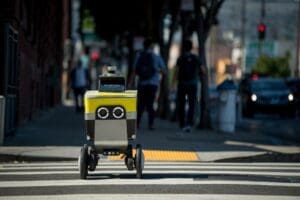 Postmates has launched a last mile delivery robot. The crowdsourced delivery company has partnered with Phantom Auto, a Silicon Valley developer of remote-control and communications technology for self-driving vehicles. Postmates has integrated Phantom’s technology into its slow-moving Serve robots that are currently being deployed in Los Angeles and tested in San Francisco. The Phantom technology acts a babysitter, if you will, for the delivery bots, by enabling remote operation and guidance and high-fidelity monitoring. The robots also use guidance software developed by Postmates engineers and laser lidar sensors, sonar, and cameras to see surroundings in the same way self-driving cars do. All of this ensures the bot does not get stuck during its delivery. And if it does? Well, a remote technician can assess the situation via the bot’s cameras and drive it out of the situation.
Postmates has launched a last mile delivery robot. The crowdsourced delivery company has partnered with Phantom Auto, a Silicon Valley developer of remote-control and communications technology for self-driving vehicles. Postmates has integrated Phantom’s technology into its slow-moving Serve robots that are currently being deployed in Los Angeles and tested in San Francisco. The Phantom technology acts a babysitter, if you will, for the delivery bots, by enabling remote operation and guidance and high-fidelity monitoring. The robots also use guidance software developed by Postmates engineers and laser lidar sensors, sonar, and cameras to see surroundings in the same way self-driving cars do. All of this ensures the bot does not get stuck during its delivery. And if it does? Well, a remote technician can assess the situation via the bot’s cameras and drive it out of the situation.
On a final note around last mile, it turns out that last mile is also the hardest part of delivering aid to hard-hit areas from hurricanes and other natural disasters. After Hurricane Dorian hit the Bahamas in early September, many companies, along with the American Logistics Aid Network (ALAN), and emergency response teams have been working to deliver aid to the islands after the devastating storm. It turns out that the hardest part of getting supplies where they are needed are the last mile logistics. According to Kathy Fulton, executive director at ALAN, they had time to begin gathering resources and do some planning in advance with its nonprofit partners on the ground. However, because the storm lingered for so long, by the end, ALAN had to see what even survived – this is called the second disaster when supplies are destroyed or expired. Even when the items survive, there is the added logistics challenge of ensuring it doesn’t end up all in one place, where it could go to waste or get damaged, and is instead sent around to multiple relief centers in the right quantities.
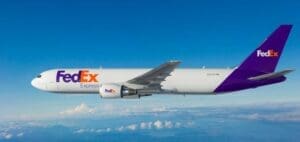 FedEx is potentially suffering the effects of a new competitor: Amazon. Recently, FedEx did not list Amazon as a competitor; instead, it was a customer and partner. However, as Amazon continues to build out its logistics network, things have clearly changed. Over the last few months, FedEx has announced that it would not renew its Express or Ground contracts with Amazon. And now, Amazon has officially listed “logistics companies” as competition, which makes things interesting. FedEx has announced that it will cut its Express capacity after peak season by retiring or parking multiple planes in its fleet as a result of weak demand for air cargo. CEO Fred Smith said the company will retire at least 20 MD 10-10 aircraft over the course of the current and next fiscal year, it is “highly likely” to retire 10 more A310 aircraft later this year and will park the equivalent of seven MD-11 planes this fiscal year.
FedEx is potentially suffering the effects of a new competitor: Amazon. Recently, FedEx did not list Amazon as a competitor; instead, it was a customer and partner. However, as Amazon continues to build out its logistics network, things have clearly changed. Over the last few months, FedEx has announced that it would not renew its Express or Ground contracts with Amazon. And now, Amazon has officially listed “logistics companies” as competition, which makes things interesting. FedEx has announced that it will cut its Express capacity after peak season by retiring or parking multiple planes in its fleet as a result of weak demand for air cargo. CEO Fred Smith said the company will retire at least 20 MD 10-10 aircraft over the course of the current and next fiscal year, it is “highly likely” to retire 10 more A310 aircraft later this year and will park the equivalent of seven MD-11 planes this fiscal year.
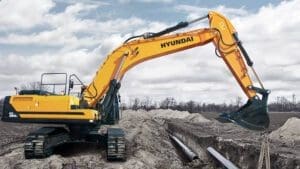 And finally, the US Justice Department and Environmental Protection Agency (EPA) said they reached an agreement in court with Hyundai Construction Equipment Americas and Hyundai Industries Co. Ltd. for the companies to pay a $47 million civil penalty for importing diesel engines that were not certified to meet Clean Air Act emissions standards. According to the Justice Department and EPA, Hyundai “stockpiled” diesel engines between 2012 and 2015 that no longer met US emissions standards. These engines were installed in over 2,000 pieces of construction equipment, which were then imported into the US. In addition, Hyundai Construction Equipment Americas imported and sold this equipment in quantities that exceeded its exemption allowance under the Transition Program for Equipment Manufacturers (TPEM) regulations.
And finally, the US Justice Department and Environmental Protection Agency (EPA) said they reached an agreement in court with Hyundai Construction Equipment Americas and Hyundai Industries Co. Ltd. for the companies to pay a $47 million civil penalty for importing diesel engines that were not certified to meet Clean Air Act emissions standards. According to the Justice Department and EPA, Hyundai “stockpiled” diesel engines between 2012 and 2015 that no longer met US emissions standards. These engines were installed in over 2,000 pieces of construction equipment, which were then imported into the US. In addition, Hyundai Construction Equipment Americas imported and sold this equipment in quantities that exceeded its exemption allowance under the Transition Program for Equipment Manufacturers (TPEM) regulations.
That’s all for this week. Enjoy the weekend and the song of the week, Moby Dick by Led Zeppelin. If you want the full experience, check out the live version, with a mix of Bonzo’s insane drum solo and his love of cars.
















